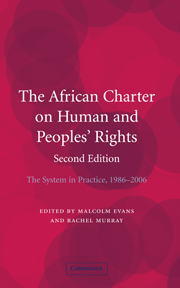Book contents
- Frontmatter
- Contents
- List of contributors
- Table of cases
- List of abbreviations
- Editors' Preface
- Introductory Preface: The African Charter and African Commission on Human and Peoples' Rights
- 1 The African Union and the Regional Human Rights System
- 2 The State Reporting Mechanism of the African Charter
- 3 Communications under the African Charter: Procedure and Admissibility
- 4 Evidence and Fact-Finding by the African Commission
- 5 Civil and Political Rights in the African Charter on Human and Peoples' Rights: Articles 1–7
- 6 Civil and Political Rights in the African Charter: Articles 8–14
- 7 Group Rights
- 8 The Role of Non-governmental Organisations and National Human Rights Institutions at the African Commission
- 9 A View from the Inside: The Role of the Secretariat
- 10 The Special Rapporteurs in the African System
- 11 Working Groups of the African Commission and their Role in the Development of the African Charter on Human and Peoples' Rights
- 12 The Creation of a New African Court of Justice and Human Rights
- 13 Protocol to the African Charter on the Rights of Women in Africa
- Bibliography
- Index
8 - The Role of Non-governmental Organisations and National Human Rights Institutions at the African Commission
Published online by Cambridge University Press: 01 July 2009
- Frontmatter
- Contents
- List of contributors
- Table of cases
- List of abbreviations
- Editors' Preface
- Introductory Preface: The African Charter and African Commission on Human and Peoples' Rights
- 1 The African Union and the Regional Human Rights System
- 2 The State Reporting Mechanism of the African Charter
- 3 Communications under the African Charter: Procedure and Admissibility
- 4 Evidence and Fact-Finding by the African Commission
- 5 Civil and Political Rights in the African Charter on Human and Peoples' Rights: Articles 1–7
- 6 Civil and Political Rights in the African Charter: Articles 8–14
- 7 Group Rights
- 8 The Role of Non-governmental Organisations and National Human Rights Institutions at the African Commission
- 9 A View from the Inside: The Role of the Secretariat
- 10 The Special Rapporteurs in the African System
- 11 Working Groups of the African Commission and their Role in the Development of the African Charter on Human and Peoples' Rights
- 12 The Creation of a New African Court of Justice and Human Rights
- 13 Protocol to the African Charter on the Rights of Women in Africa
- Bibliography
- Index
Summary
Introduction
Non-governmental organisations (NGOs) and national human rights institutions have played, and continue to play, a key role in advancing the promotional and protective activities of the African Commission on Human and Peoples' Rights (“the African Commission” or “the Commission”). Arguably, the effectiveness and visibility of the African Commission are owed to the active participation of non-State actors, such as NGOs, in its activities.
African institutions value the contribution of NGOs in the fostering of a human rights culture on the African continent. The Grand Bay (Mauritius) Declaration firmly recognises the contribution of civil society in the promotion of human rights in Africa. In addition, the African Union (AU) encourages NGOs to participate in decision-making processes in building democracy in Africa.
The African Commission has encouraged the participation of civil society in its promotional and protective work, as well as in the elaboration of principles and standards on human and peoples' rights. The active participation of NGOs in the activities of the African Commission is, in part, a desire to have a functional and robust regional body charged with protecting and promoting rights. The African Commission remains the only treaty body with this broad mandate. Even with the functioning of the African Court on Human and Peoples' Rights (“the African Court” or “the Charter”), which will deliver binding judgments, the African Commission will occupy a prominent position in promoting human rights and guiding policy at national level.
- Type
- Chapter
- Information
- The African Charter on Human and Peoples' RightsThe System in Practice 1986–2006, pp. 289 - 315Publisher: Cambridge University PressPrint publication year: 2008
- 1
- Cited by



